Deploying Coro with JumpCloud
This guide describes how to deploy the Coro Agent to your macOS endpoint devices through JumpCloud.
JumpCloud does not support dynamic links and requires a non-changing, static URL to deploy applications using their Software Management feature. This is a known limitation - to learn more, see: https://jumpcloud.com/support/software-management-macos.
Coro recommends deploying the Agent in one of the following ways:
Use a shell script. For full details, see Using a shell script to deploy Coro to macOS devices.
Host the Agent installer package on your cloud storage service (such as AWS, Backblaze, or Dropbox), as recommended by JumpCloud. Then, set the installer path to the relevant location in that service. For example: https://host.com/path/CoroInstaller_123abc-456def-789abc.pkg. Through this method, you can utilize your new static URL to deploy the Agent using JumpCloud's Software Management feature. For information and questions regarding this method, contact JumpCloud Support.
To deploy the Coro Agent via JumpCloud, complete the following processes:
Prerequisites
Make sure you have the following prerequisites:
Admin access to an active JumpCloud environment, configured to allow package and configuration deployment to your devices.
Coro Agent installer (.pkg) file.
Downloading the Coro Agent installer
To download the Coro Agent installer package:
From the sidebar, select Control Panel.
Select Devices:
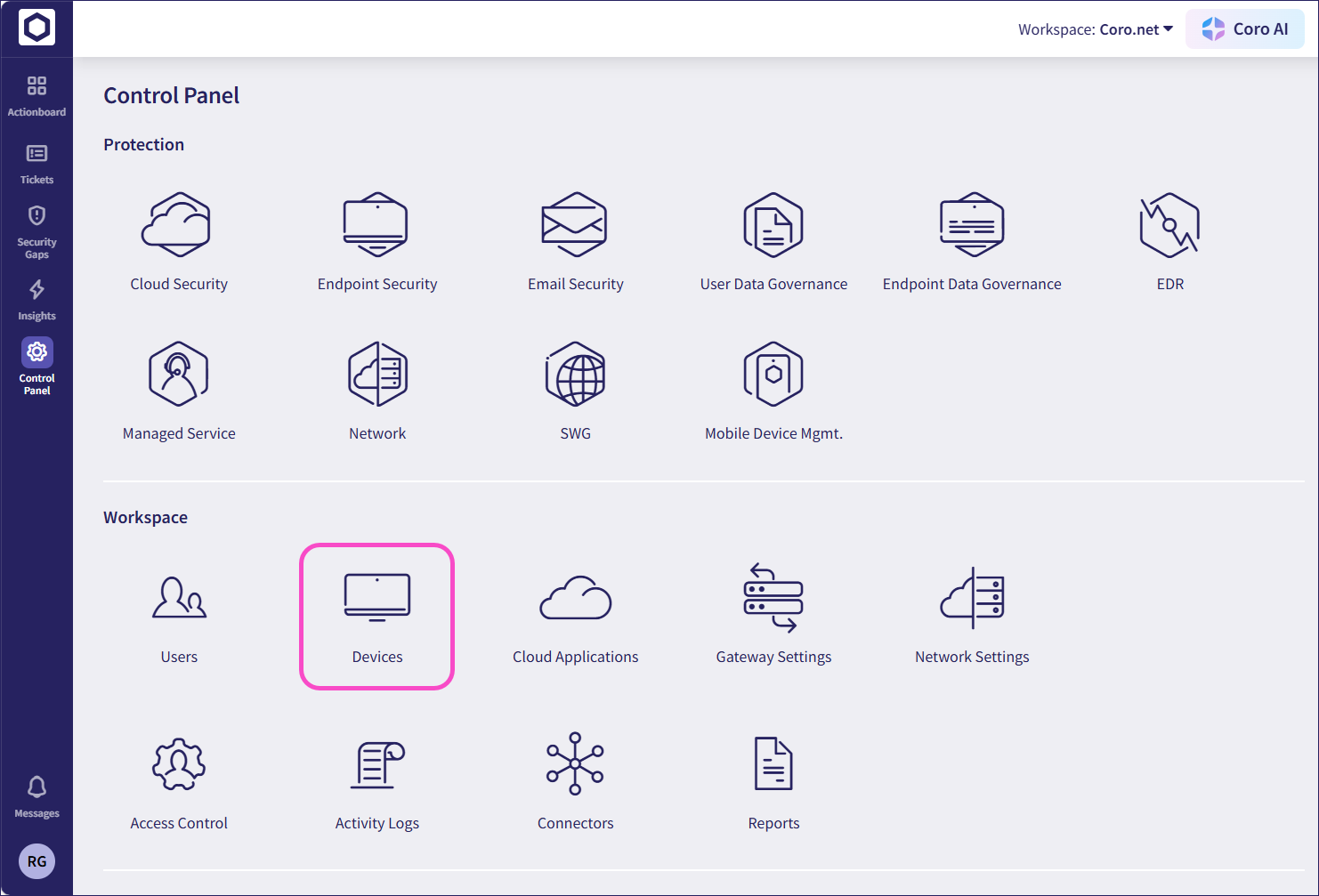
Select Agent Deployment:
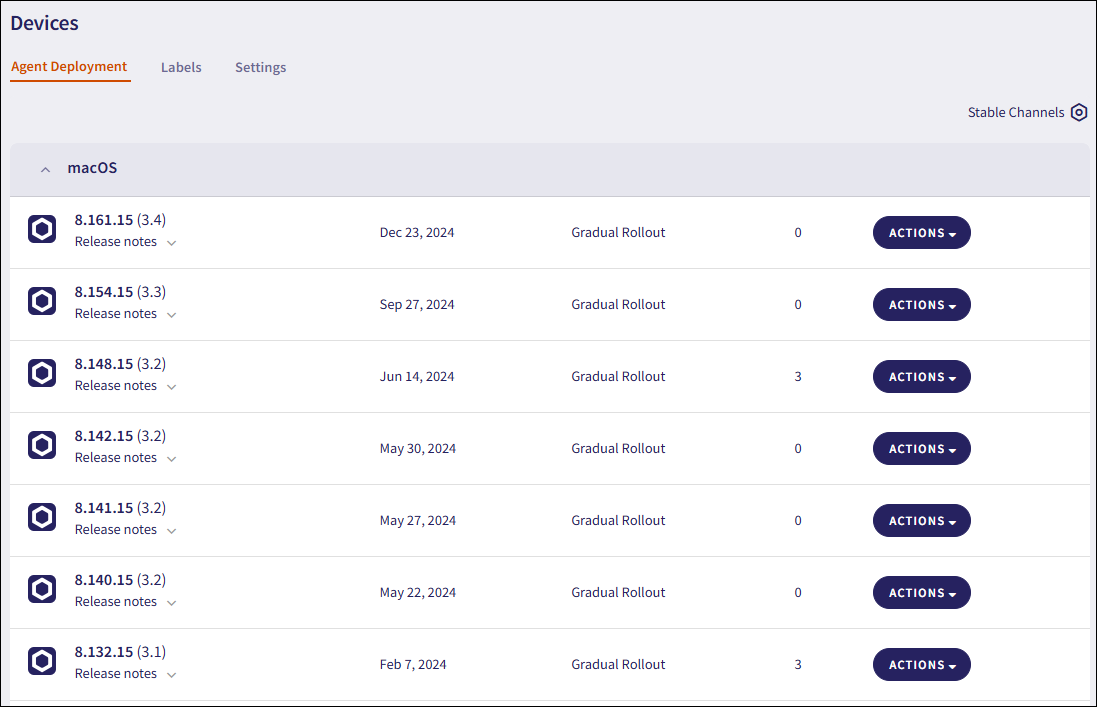
Select ACTIONS > Download adjacent to the macOS Agent version you want to install:

Coro downloads the Agent installer to your device, ready for hosting in cloud storage.
Configuring JumpCloud policies
Perform the following steps to configure the JumpCloud policies for deploying the Coro Agent on a group of devices:
Sign in to the JumpCloud Admin Portal (https://console.jumpcloud.com/login), and then go to DEVICE MANAGEMENT > Policy Management.
Create a policy for automatically approving Coro notifications.
Create a policy for automatically approving Coro’s web content filter.
Creating policies for application privacy preferences
To create policies for application privacy preferences:
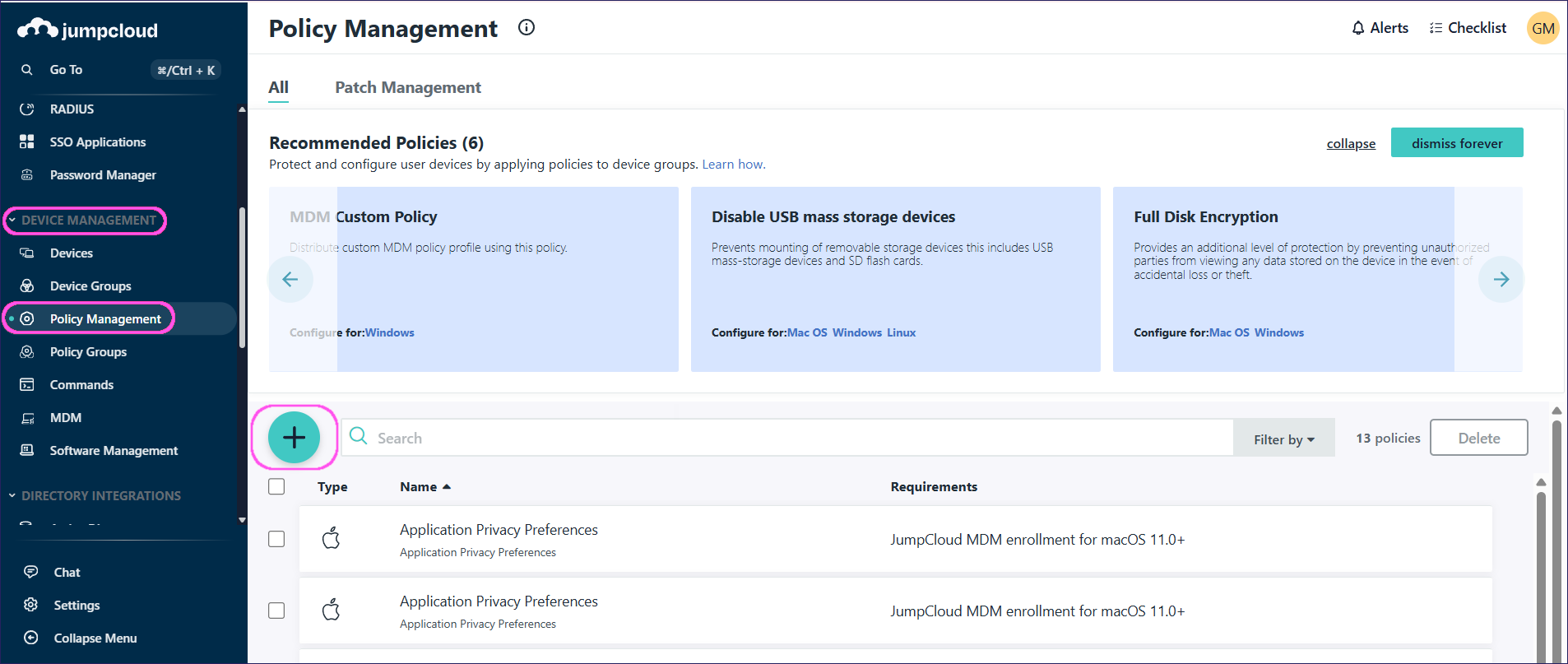
JumpCloud displays the New Policy dialog.
At the top of the dialog, select Mac:
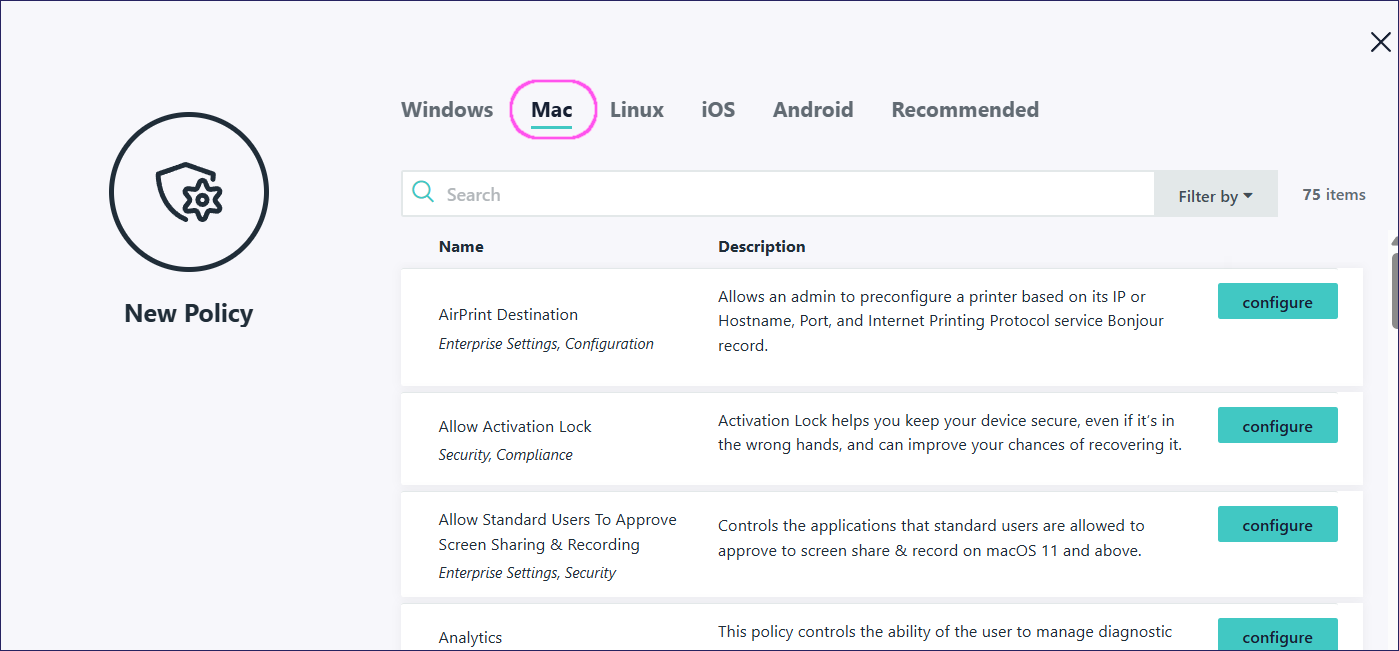
JumpCloud displays the Mac tab.
Locate Application Privacy Preferences and select configure:
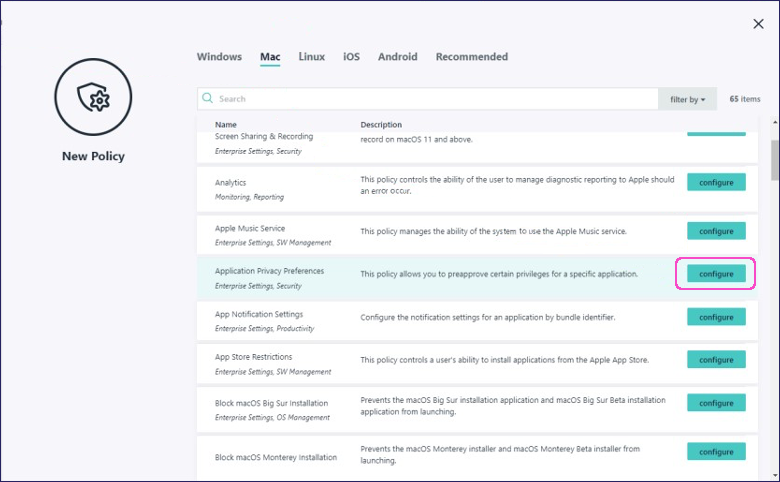
JumpCloud displays the Details tab:
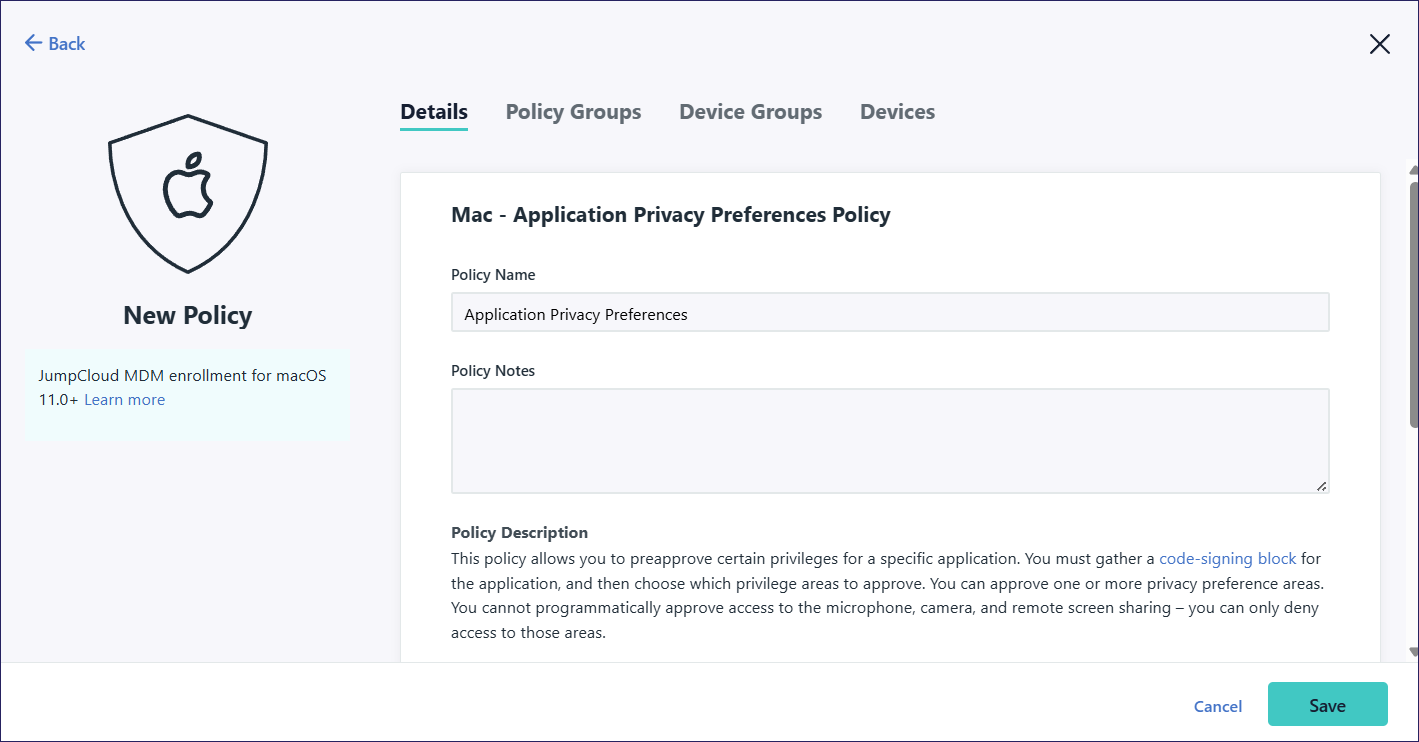
(Optional) In Policy Name enter a new name for the custom configuration profile policy or keep the default.
Locate and select Application Information. Configure the following settings:
Code Requirement: Copy and paste
anchor apple generic and identifier "net.coro.endsec.Coro" and (certificate leaf[field.1.2.840.113635.100.6.1.9] /* exists */ or certificate 1[field.1.2.840.113635.100.6.2.6] /* exists */ and certificate leaf[field.1.2.840.113635.100.6.1.13] /* exists */ and certificate leaf[subject.OU] = E3P52EVK39)Do not change the code as it results in Apple not approving the policy.
Identifier: Enter net.coro.endsec.Coro
Identifier Type: Select BundleID
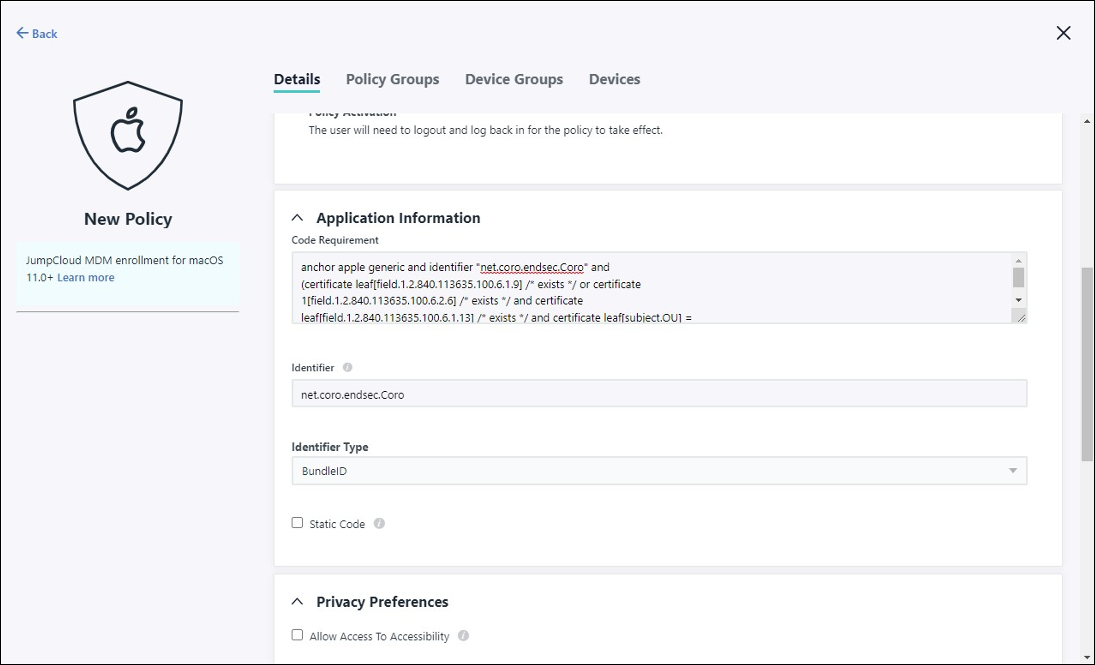
Locate Privacy Preferences and enable the following settings:
Allow Access to All Files
Allow Access to SysAdmin Files
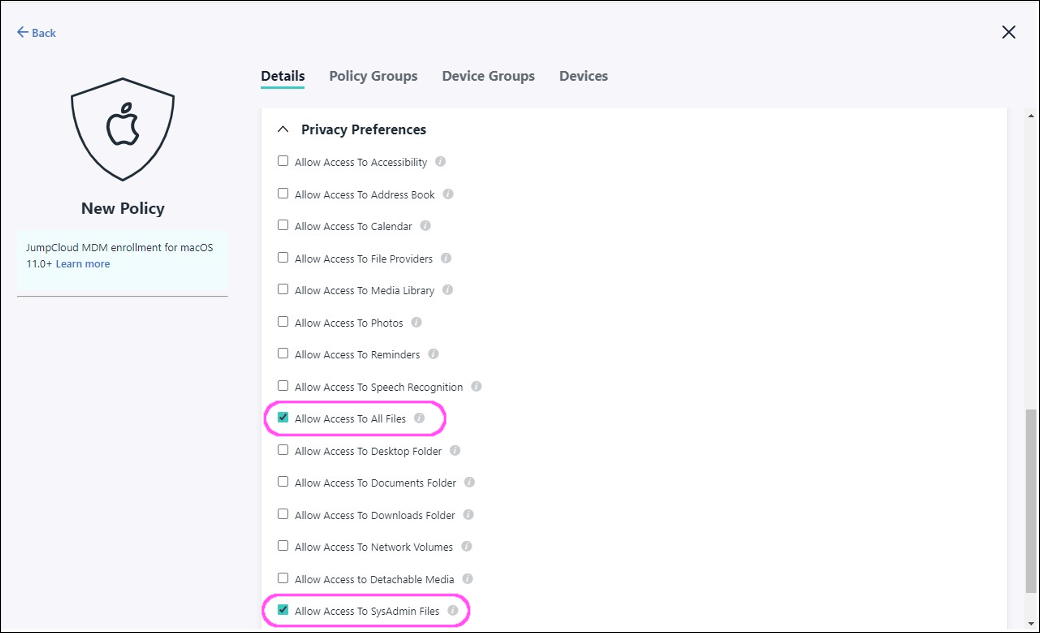
Select Save to add the new policy.
Add a second policy by repeating steps 1 - 6, but for Application Information configure the following settings:
Code Requirement: Copy and paste
anchor apple generic and identifier "net.coro.endsec.CoroService" and (certificate leaf[field.1.2.840.113635.100.6.1.9] /* exists */ or certificate 1[field.1.2.840.113635.100.6.2.6] /* exists */ and certificate leaf[field.1.2.840.113635.100.6.1.13] /* exists */ and certificate leaf[subject.OU] = E3P52EVK39)Identifier: Enter net.coro.endsec.CoroService
Identifier Type: Select BundleID
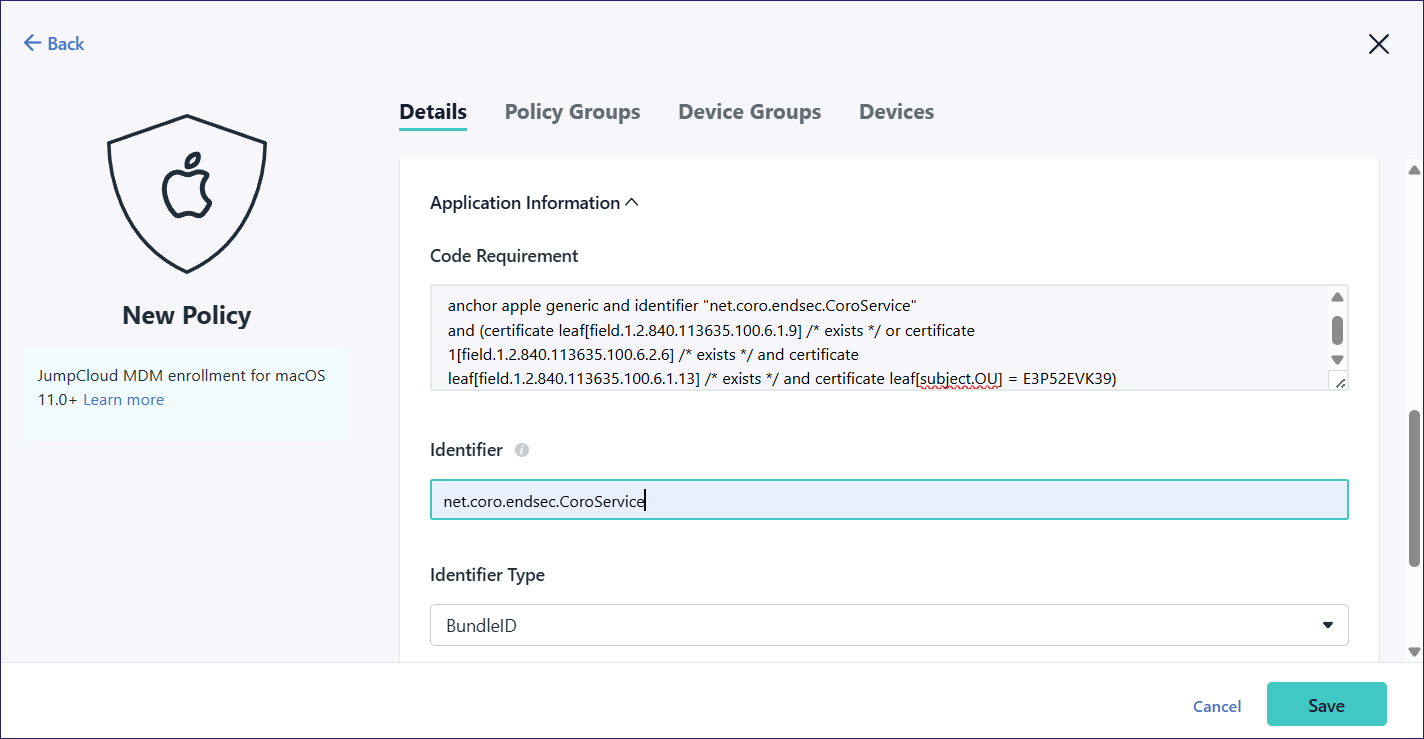
Add a third policy by repeating steps 1 - 6, but for Application Information configure the following settings:
Code Requirement: Copy and paste
anchor apple generic and identifier "net.coro.endsec.TrafficService" and (certificate leaf[field.1.2.840.113635.100.6.1.9] /* exists */ or certificate 1[field.1.2.840.113635.100.6.2.6] /* exists */ and certificate leaf[field.1.2.840.113635.100.6.1.13] /* exists */ and certificate leaf[subject.OU] = E3P52EVK39)Identifier: Enter net.coro.endsec.TrafficService
Identifier Type: Select BundleID
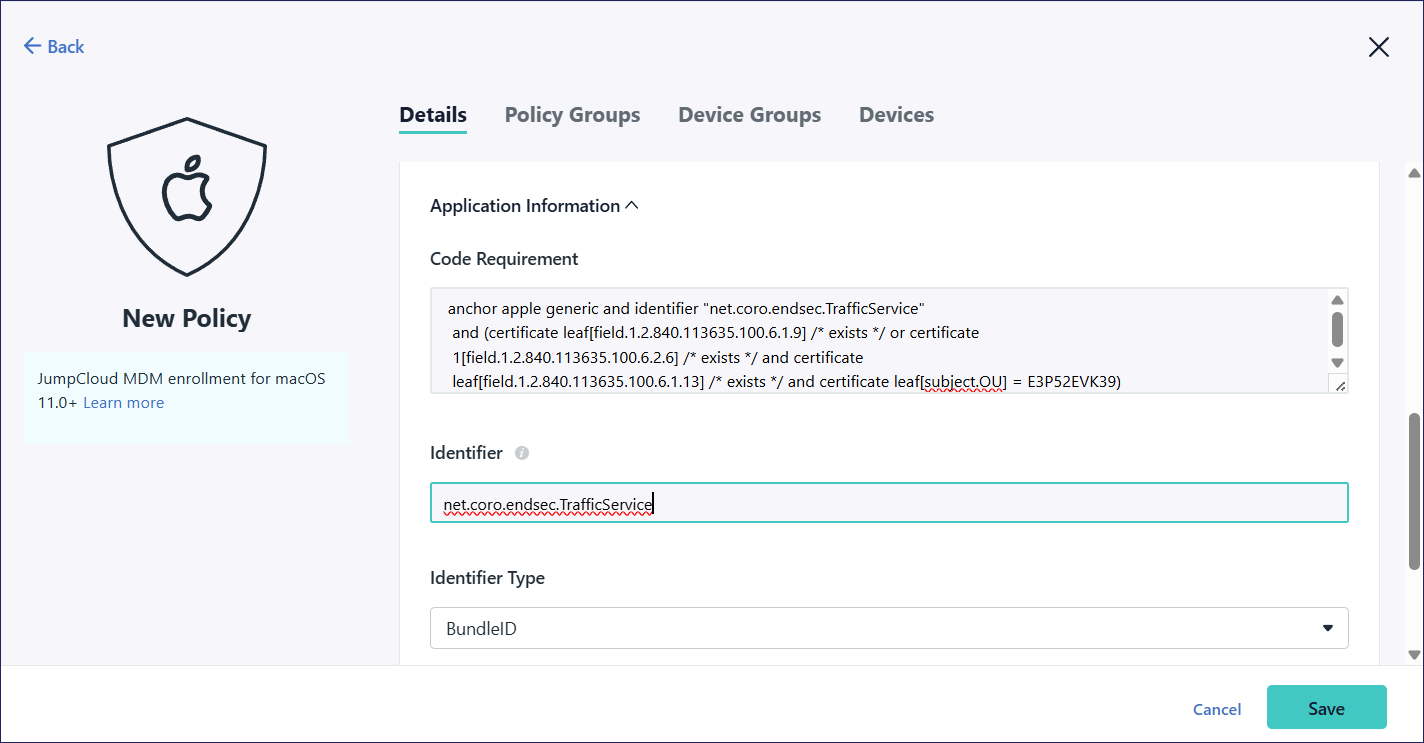
Add a fourth policy by repeating steps 1 - 6, but for Application Information configure the following settings:
Code Requirement: Copy and paste
anchor apple generic and identifier "net.coro.endsec.CoroGuard" and (certificate leaf[field.1.2.840.113635.100.6.1.9] /* exists */ or certificate 1[field.1.2.840.113635.100.6.2.6] /* exists */ and certificate leaf[field.1.2.840.113635.100.6.1.13] /* exists */ and certificate leaf[subject.OU] = E3P52EVK39)Identifier: Enter net.coro.endsec.CoroGuard
Identifier Type: Select BundleID
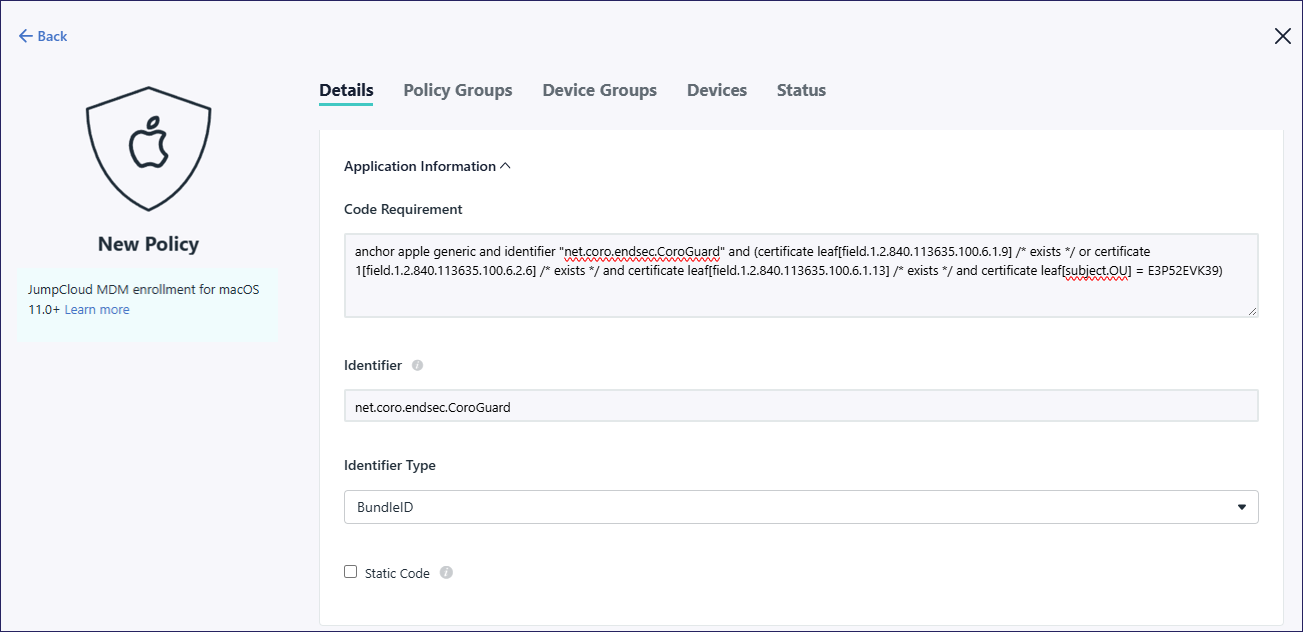
Creating a policy for approving system extensions
To create a policy for approving system extensions:
From the Policy Management page, Select +.
At the top of the dialog, select Mac:
Locate System Extension and select configure:
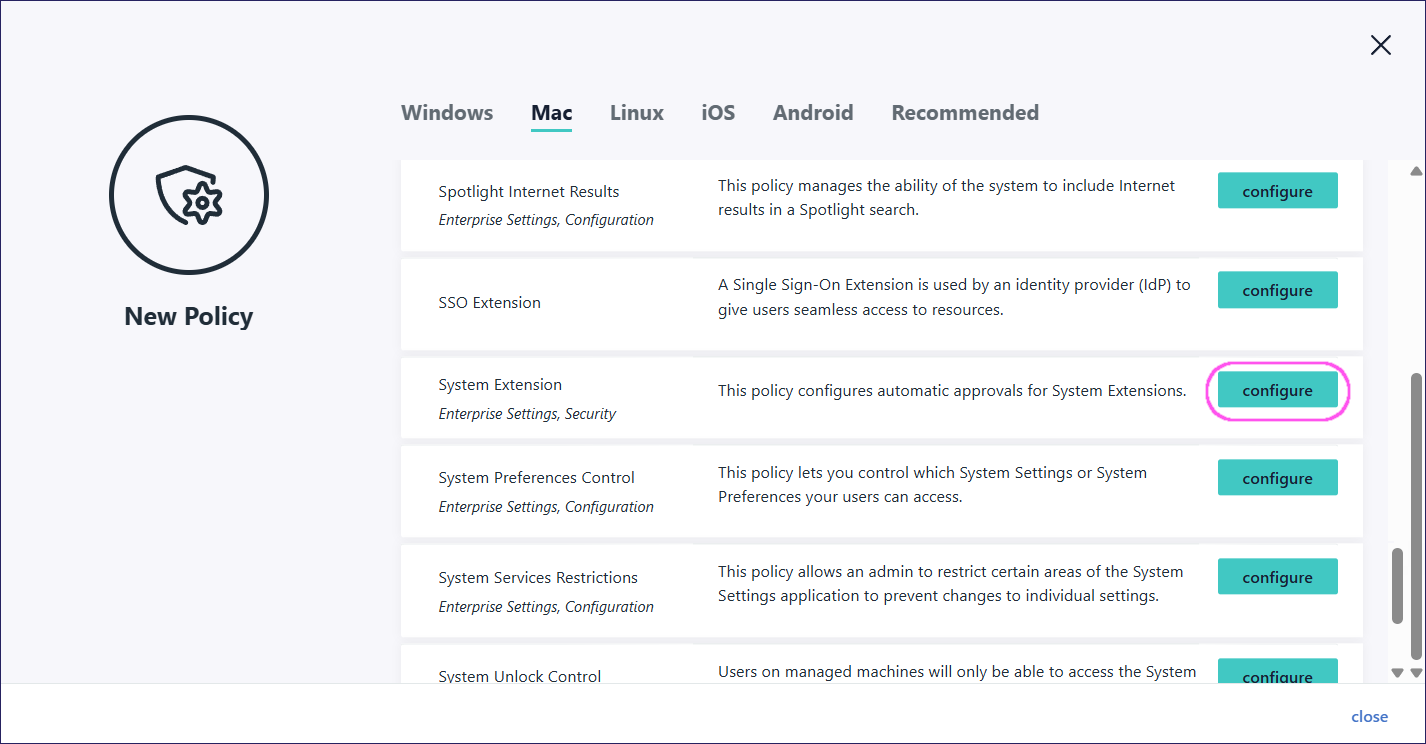
Specify the following settings:
(Optional) In Policy Name enter a new name for the custom configuration profile policy or keep the default.
team ID: Enter E3P52EVK39
Bundle ID: For each of the following, select Add Bundle ID and add the ID:
- net.coro.endsec.CoroGuard
- net.coro.endsec.TrafficService
- net.coro.endsec.CoroService
- net.coro.endsec.Coro
Security Extension: Enable
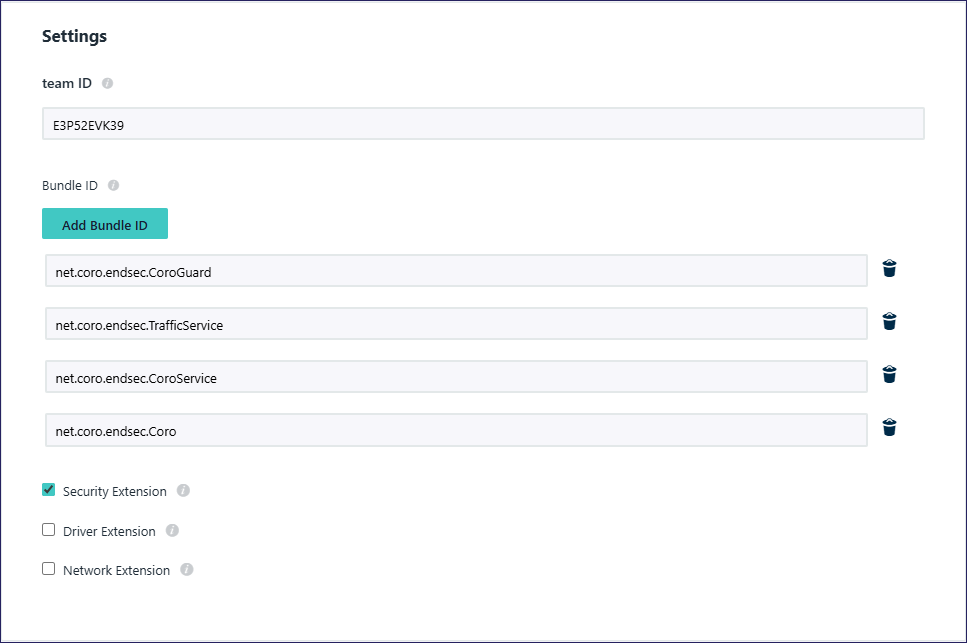
Select Save.
Creating a policy for automatically approving Coro notifications
To create a policy for automatically approving notifications:
Go to DEVICE MANAGEMENT > Policy Management. Select + to create a policy.
At the top of the dialog, select Mac.
Locate App Notification Settings and select configure:
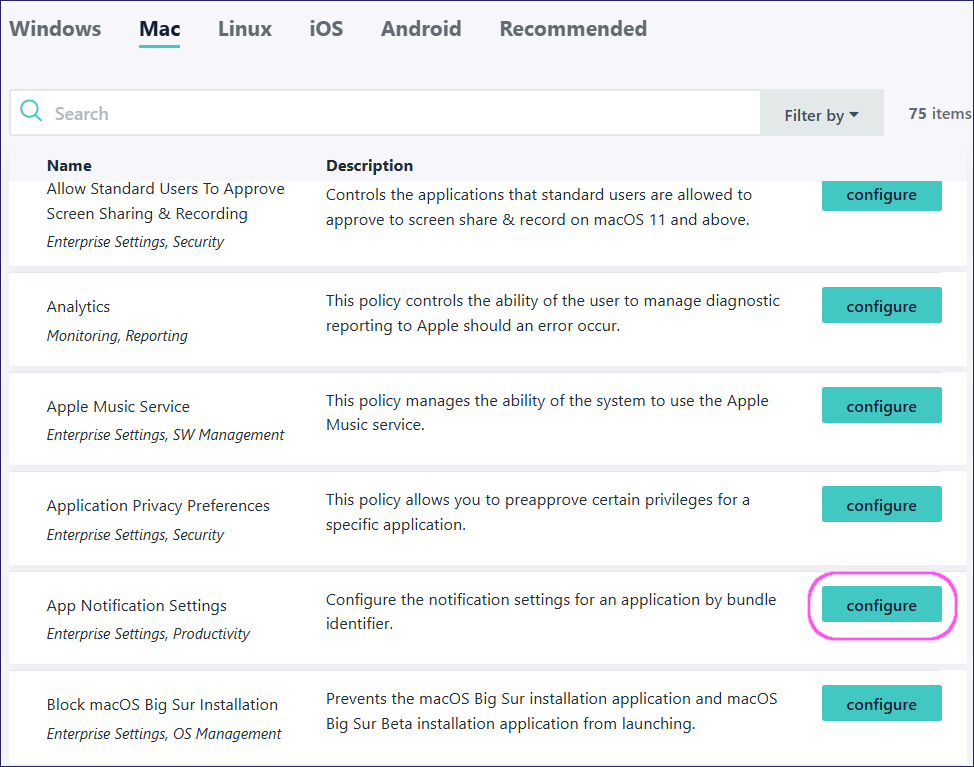
On the Details tab, specify the following settings:
(Optional) In Policy Name enter a new name for the custom configuration profile policy or keep the default.
Bundle Identifier: Enter net.coro.endsec.Coro
Select the alert types to automatically approve for devices using this policy:
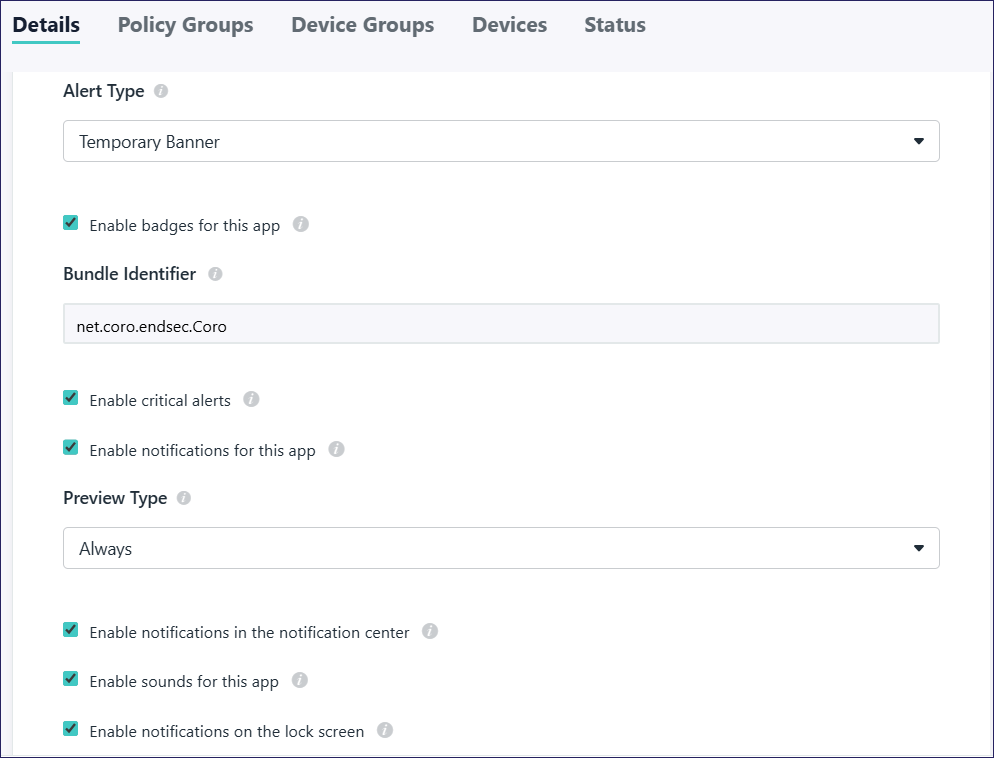
Select Save.
Creating a policy for automatically approving Coro’s web content filter
Create a configuration profile policy by creating a configuration file and then creating a policy that uses it.
To create a policy for automatically approving or enabling Coro’s web content filter:
Copy the following configuration listing:
Expand for configuration listing
{% partial file="../../_partials/_Config.mobileconfig.md" /%}Paste the configuration listing into a text editor and save it as coroagent.mobileconfig.
Go to DEVICE MANAGEMENT > Policy Management. Select + to create a policy.
At the top of the dialog, select Mac.
Locate MDM Custom Configuration Profile, then select configure:
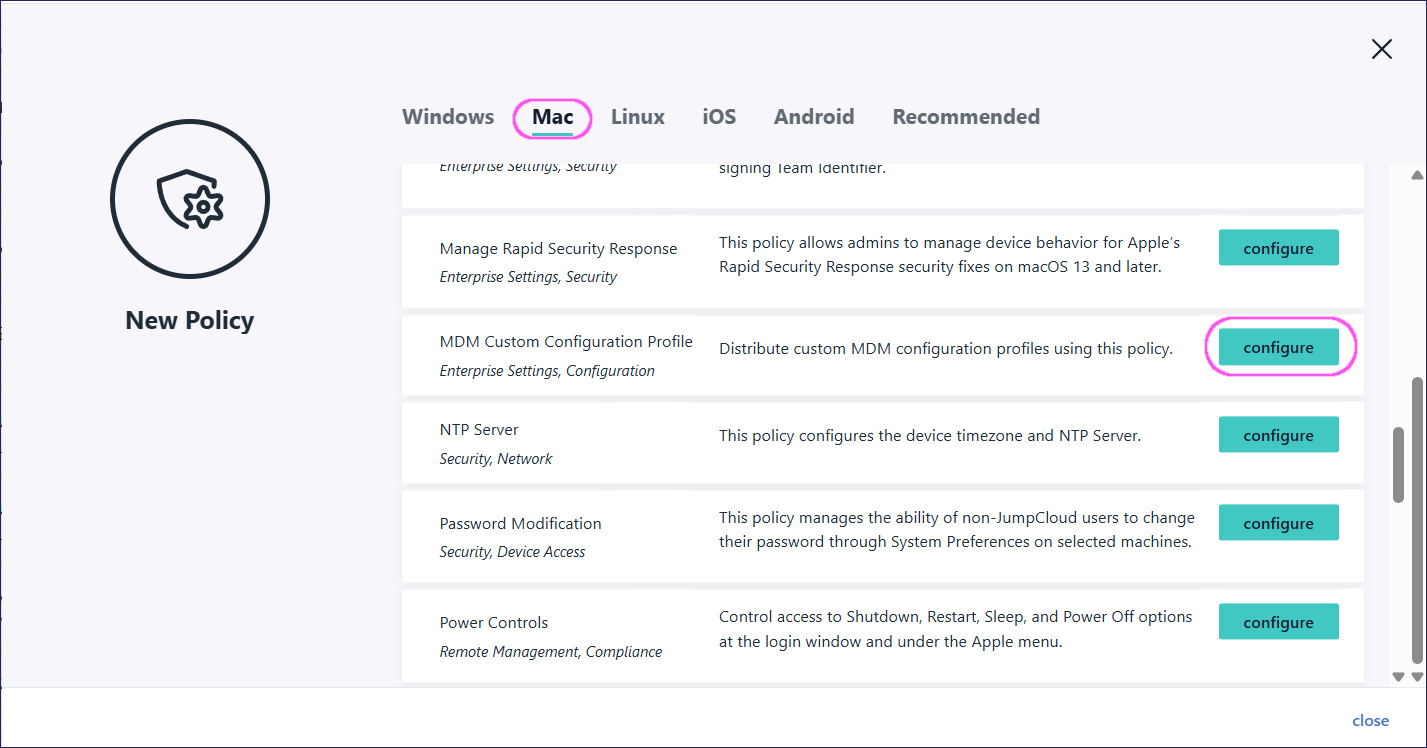
(Optional) In Policy Name enter a new name for the custom configuration profile policy or keep the default.
Under Settings, select upload file:
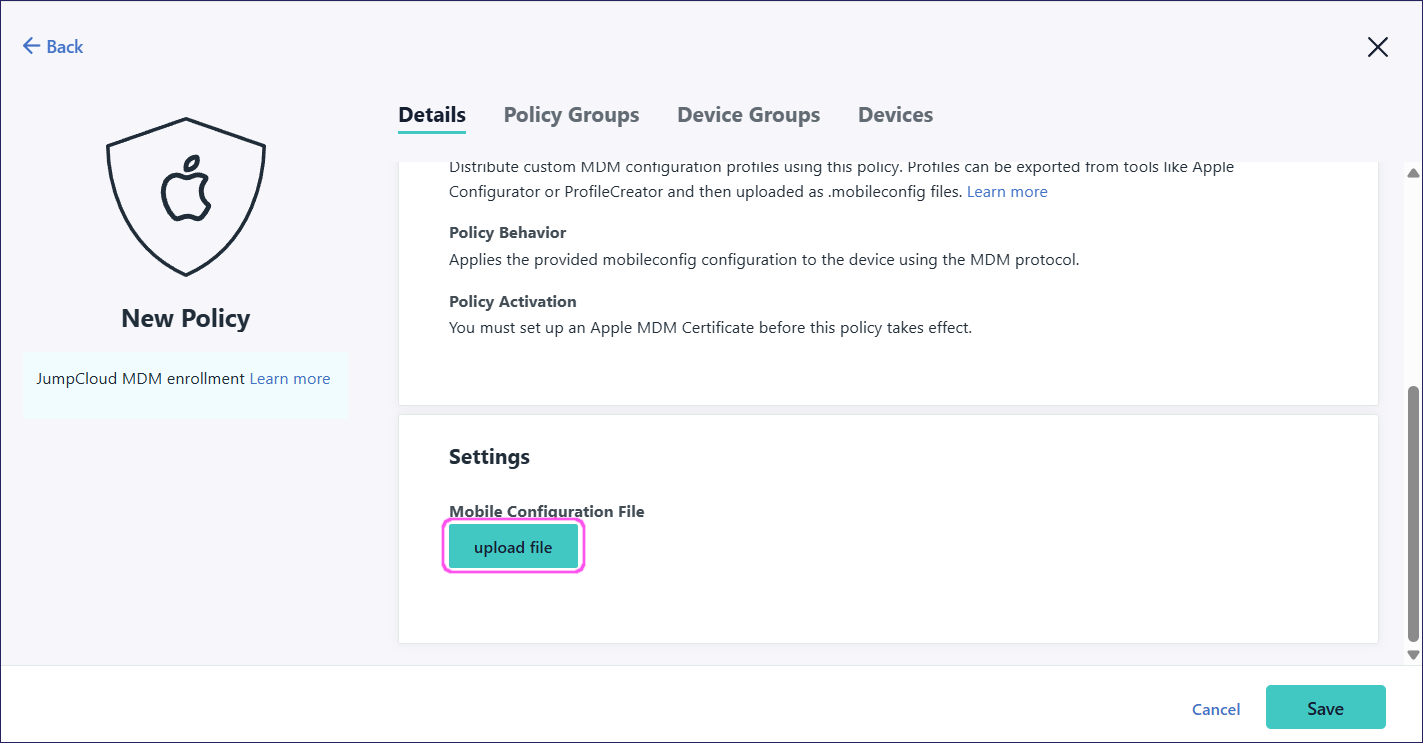
Select coroagent.mobileconfig and select Open.
Upload the coroagent.mobileconfig file to the custom configuration profile and select Save.
Applying the policies to a group of devices
This section describes the steps to apply the policies to a group of devices:
To apply the new Coro policies to a group of devices:
Go to DEVICE MANAGEMENT > Device Groups:
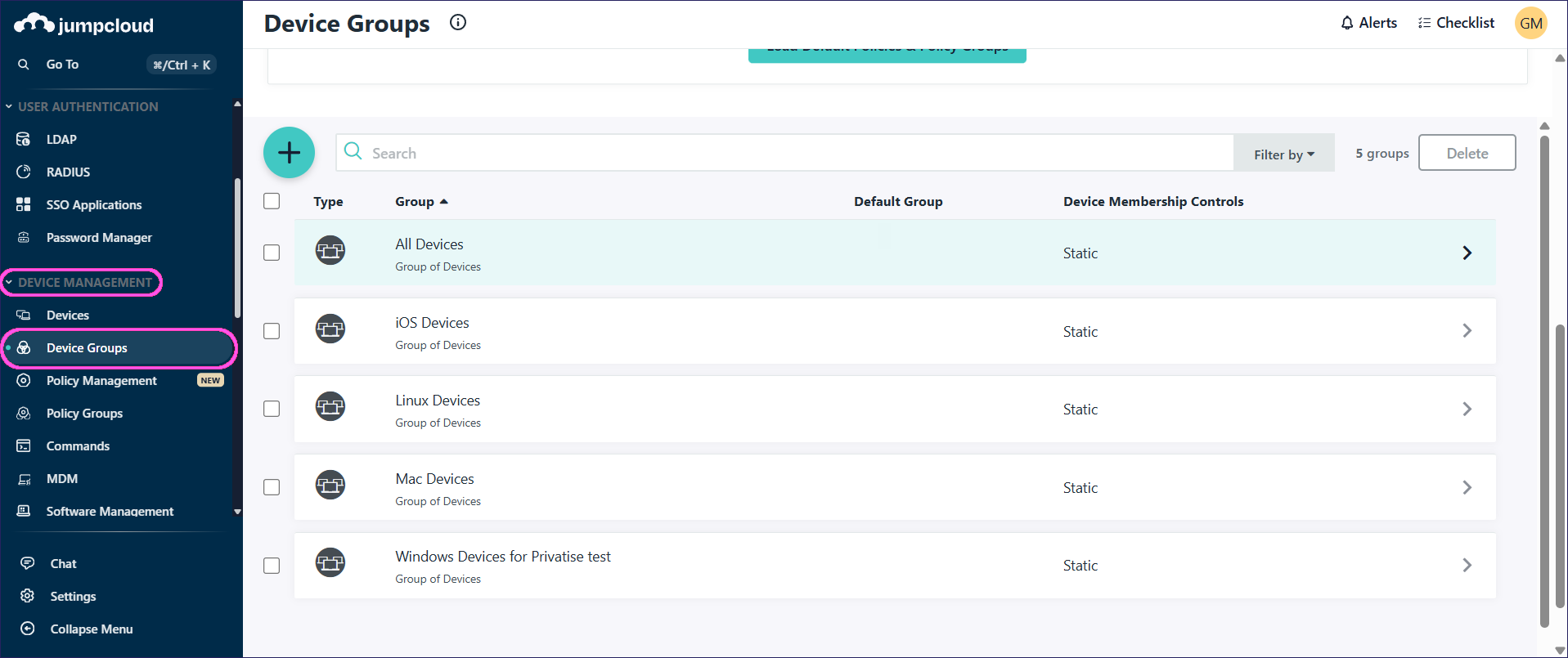
Select a group of devices to apply the policies to. Alternatively, select + to create a group, and then select the new group.
Select Policies.
JumpCloud displays the Policies tab:
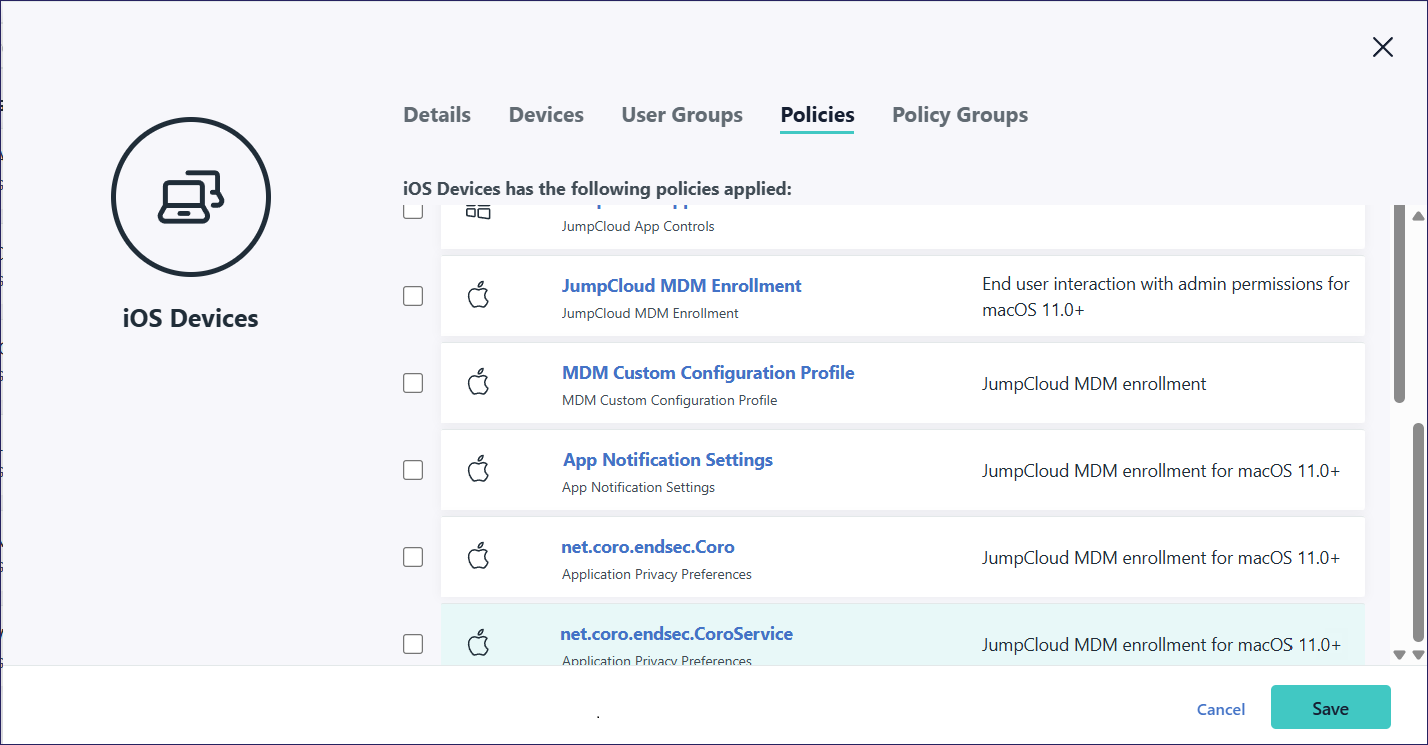
From the list of policies, select the new policies, then select Save.
Go to DEVICE MANAGEMENT > Policy Groups. Select one of:
+ to create a policy group.
An existing policy group suitable to distribute the Coro Agent to your devices:
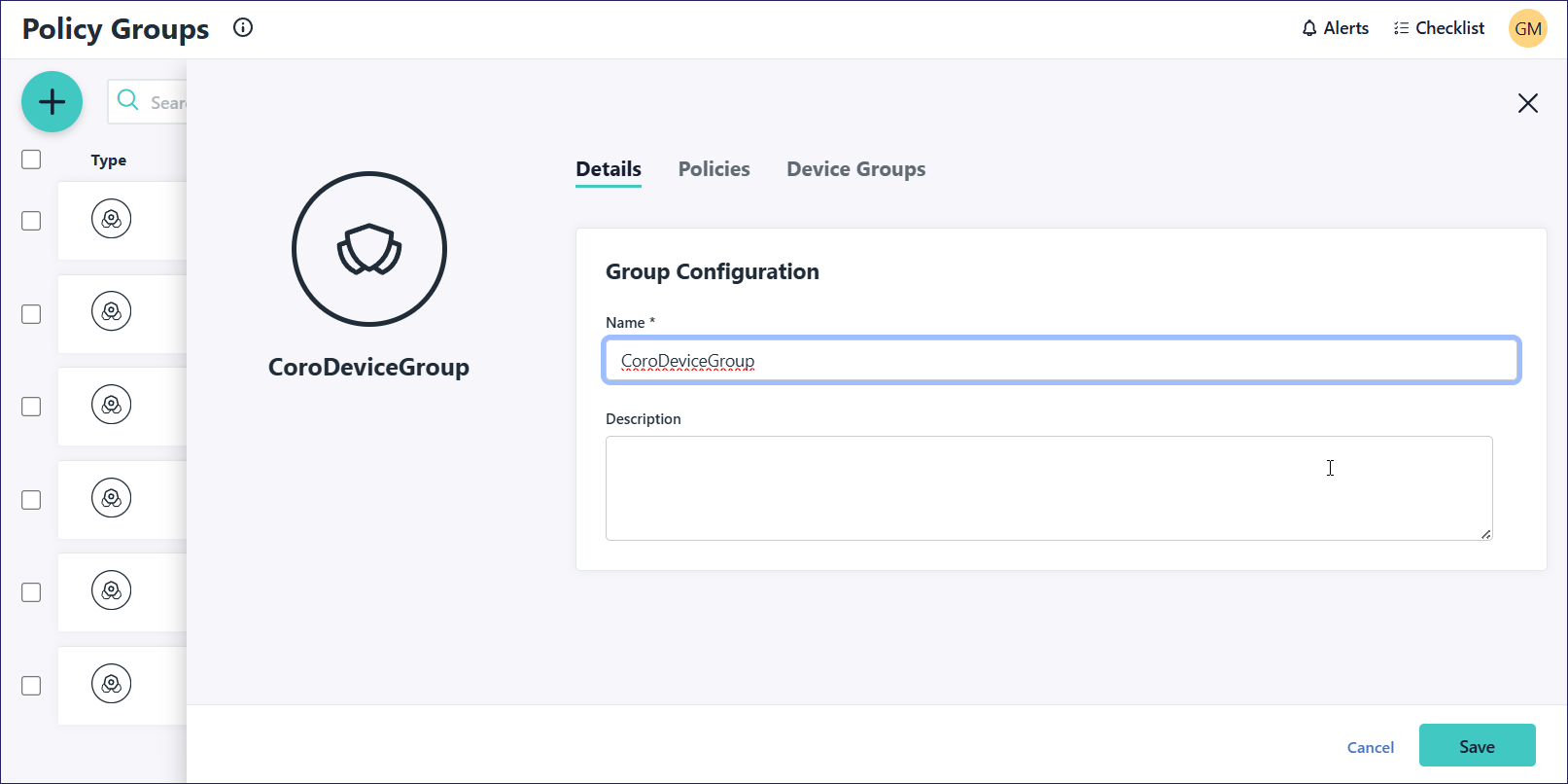
Go to DEVICE MANAGEMENT > Software Management:
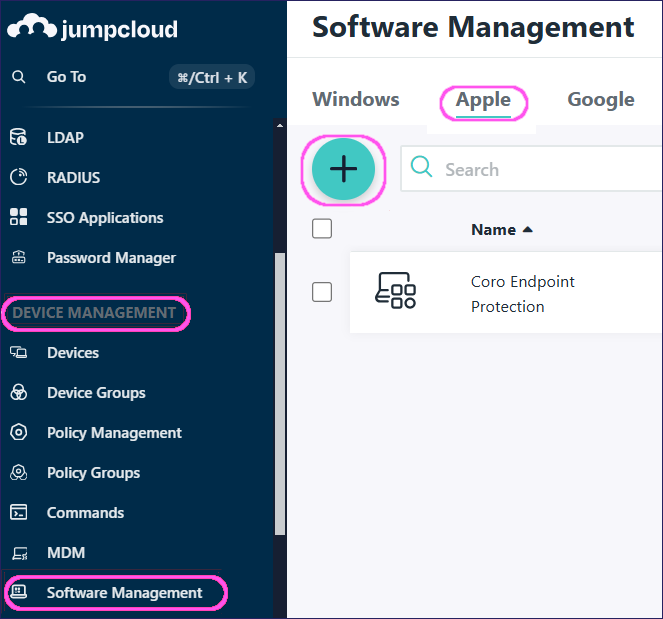
JumpCloud opens the Software Management page.
Select Apple, then select + to configure the upload settings.
On the Details tab, in Software Description, enter a name for your installation package. In Software Package URL add your Coro Agent installer package cloud storage location URL, and then select Validate to validate the URL:
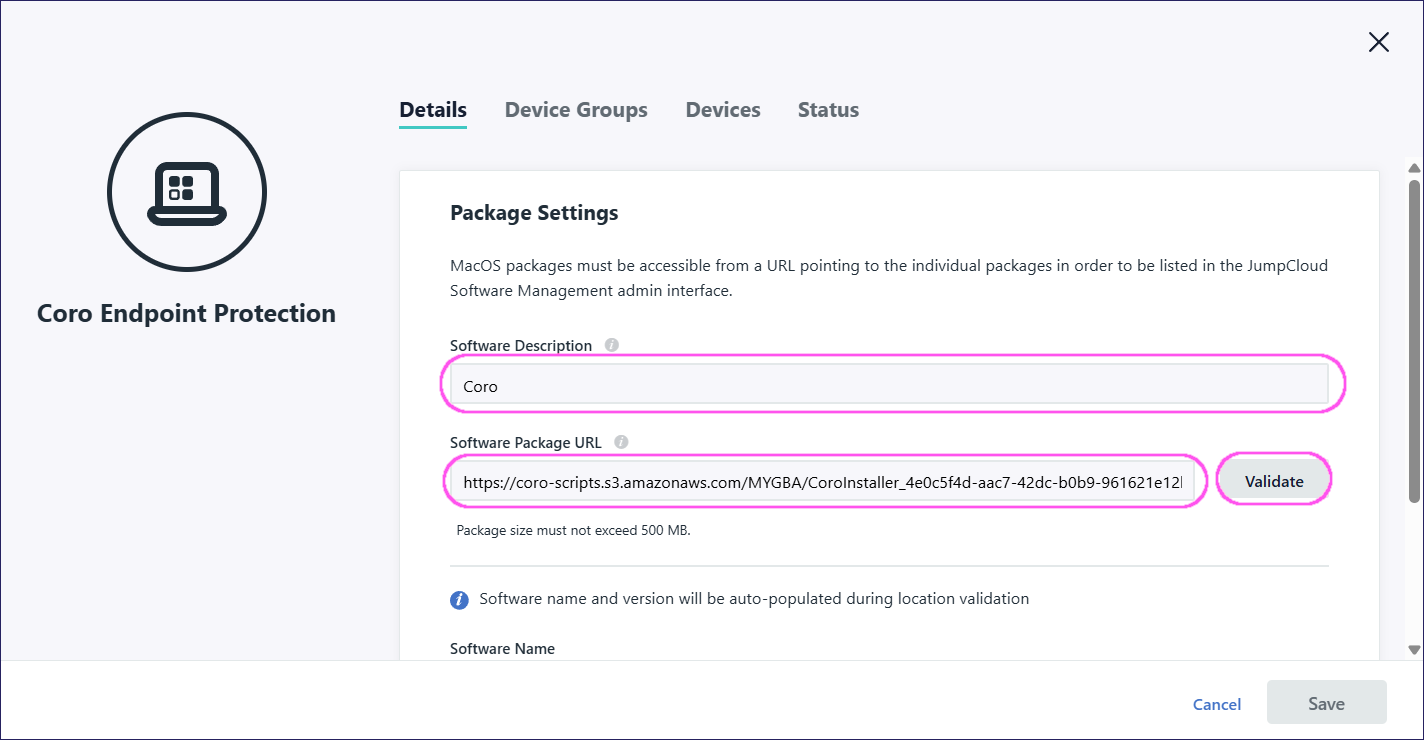
If this method fails due to JumpCloud validation failure of external URL package hosting, Coro recommends deploying the Coro Agent via shell script. To execute a command in JumpCloud, go to Device Management > Commands. Select + and set Type to Mac. If you experience issues executing commands, contact JumpCloud Support.
Select Device Groups or Devices as applicable to configure your device distribution.
Select Save to save your changes.
The JumpCloud configuration is complete. Your JumpCloud schedule determines when to distribute and install the Coro Agent.